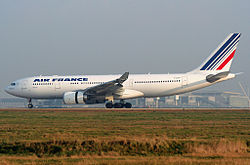Air France, pilots union, victims group criticise transatlantic disaster probe
Friday, August 5, 2011

More than two years after Air France Flight 447 crashed into the Atlantic, killing 228, a French pilots union, a group supporting victims' families, and Air France have all criticised the ongoing investigation. The Bureau d'Enquêtes et d'Analyses (BEA) is being accused of trying to blame the pilots in order to absolve Airbus.
The controversy follows the release of the BEA's latest interim report detailing findings so far. At the last moment, the BEA removed a recommendation added by chief investigator Alain Bouillard which called for alarms on Airbus A330s to be modified.
The National Airline Pilots Union (SNPL) is concerned the investigation is degenerating "into a simple charge sheet against the crew," and says the latest revelations left them with "seriously damaged" faith in the investigators. The SNPL has withdrawn all support in the probe. Air France claim alarms on the A330-200 were "misleading" and contributed to the disaster. Robert Soulas, president of French victims' families group Entraide et Solidarité AF447, claims the move proves bias in the BEA.
The dispute surrounds stall warning systems. An aircraft stalls if it no longer has sufficient speed to keep itself airbourne. The warnings cut out at extremely low speeds, meaning if a stall progresses far enough the warning can cease. The correct course of action in a stall is to lower the nose, increasing an aircraft's speed; if the speed increases, the warnings can sound again. This may confuse pilots into abandoning corrective measures.
The BEA have responded that the last-minute call to remove a recommendation calling for changes to stall warning design was owing to a need to examine the issue further. They say behavioral psychologists and cockpit designers have been teamed up to look into the warnings and how crews respond to them. The BEA intends to make a recommendation on the issue in the future, and a spokesperson expressed "deep regret" at the SNPL's response.
Friday's 117-page report did examine the actions and training of the pilots. The report says they were untrained in high-altitude manual flying and in how to identify and react to failures of speed sensors. Neither was a standard part of training at the time.
The speed sensing system failed, causing the autopilot and autothrust to switch off. This was followed by stall warnings, which the interim BEA report say were ignored by pilots during a three-and-a-half minute fall of 38,000 feet into the ocean.
"The haste with which these authorities and these officials accused the pilots without any forethought aroused our suspicions," said Soulas. "We now have confirmation that the affirmations coming from the BEA were not only premature, (but) lacking any objectivity, partial and very oriented towards the defence of Airbus." For weeks his organisation has mounted protests against the direction taken by the investigation.
Air France, who are battling legally with Airbus over responsibility (both firms are also under criminal investigation), wrote to the European Aviation Safety Agency asking that they examine the stall warnings and seek that they be changed in need be. Air France previously upgraded the speed sensors on their A330s.
Junior Transport Minister Thierry Mariani defended the BEA. "There has never been such a transparent enquiry: it was filmed, took place under the judiciary's control, with Brazilian [and] American investigators. These controversies discredit an enquiry that is exemplary." Airbus also responded. "Can you imagine for an instant that, because of economic interests or links between the BEA and Airbus, we'd put in peril all the other airlines operating this plane? It's neither conceivable nor admissible," said a statement. About 180 airlines use the Airbus A330.
Sources
- Nicola Clark. "French Union Halts Help Into Inquiry in Jet Crash" — The New York Times, August 3, 2011
- Elodie Mazein. "Rio-Paris jet crash probe 'discredited': relatives" — Agence France-Presse, August 3, 2011
- John Lichfield. "Angry pilots say Air France crash inquiry shields Airbus" — The Independent, August 4, 2011